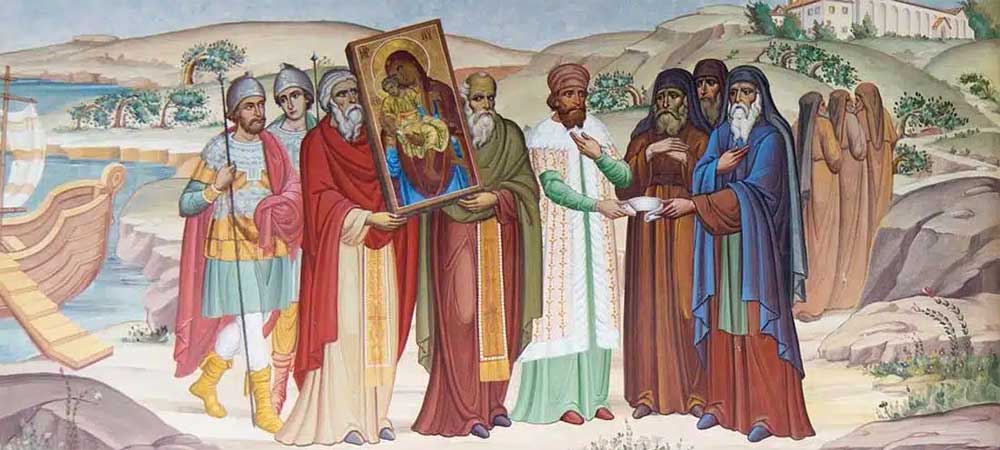Life of Saint Constantine the Great
 The Roman emperor Constantine the Great, declared by the Orthodox Church as a Saint and Equal Apostle, because he supported Christianity in every way. His memory is celebrated together with that of his mother Saint Helen on May 21. The Roman Catholic Church has not included him among its Saints, because historical research charges him with ordering the murder of Crispus’ son and his second wife Fausta (Crispas and Fausta must have had an affair, according to recent historical data) .
The Roman emperor Constantine the Great, declared by the Orthodox Church as a Saint and Equal Apostle, because he supported Christianity in every way. His memory is celebrated together with that of his mother Saint Helen on May 21. The Roman Catholic Church has not included him among its Saints, because historical research charges him with ordering the murder of Crispus’ son and his second wife Fausta (Crispas and Fausta must have had an affair, according to recent historical data) .
Flavius Valerius Aurelius Constantinus (Flavius Valerius Aurelius Constantinus) was born on February 27, 272 in Naissos in Upper Moesia (today Nis in Serbia) and was the son of the Roman officer Constantius Chlorus and his wife or concubine Helen. He learned encyclical letters from his father and from a young age enlisted in the Roman army, where he distinguished himself for his administrative skills and general personality. His father’s promotion to the highest echelons of the empire aided his own rise in Rome’s military hierarchy.
In 305 he followed his father on his campaign in Great Britain and after his death (July 7, 306) was proclaimed by the troops as his successor with the title of Augustus at Evoracus (now York). In a period of great tension in the empire due to polyarchy, Constantine wanted to become sovereign first in the Western part and then in the East. That is why he first had to defeat the other Augustus of the West, Maxentius.
The armies of Constantine and Maxentius met in October 312 on the outskirts of Rome, near the Mulbia bridge over the Tiber. On the eve of the battle, on October 27, Constantine saw his famous vision, according to which rays of light formed in the sky a cruciform complex with the phrase “In this Nika”. This incident, which he regarded as “divine inspiration”, combined with his military skills, led him the next day (October 28) to a proud victory over Maxentius, which made him sovereign of the West.
Although he did not have the slightest connection with Christianity, he spread the dynamics of this religion and decided to adopt it and incorporate it into his politics. In 313 he signed with his ally in the East Licinius the “Decree of Milan”, which guaranteed the principle of secularism and religious freedom in his territory. The ground had been prepared since 311 by the decree of Emperor Galerius, which stopped the persecutions against the Christians.
Constantine’s ambitions did not stop with his conquest of the West. He wanted to dominate the entire empire and therefore very quickly came into conflict with his ally in the East and son-in-law of Licinius (Licinius was the husband of Constantine’s sister, Constantias). Constantine prevailed in a series of battles and naval battles and in 324 became sovereign of the entire empire.
After his conquest, Constantine’s main concern was to restore the faltering empire. With a series of reforms he carried out, he restored the unity of the imperial power and limited the centripetal tendencies, by abolishing the offices of Augustus and Caesar, while significantly limiting the powers of the Senate. In the economic field, he minted a new currency, the solidus, and made massive purchases of gold, which not only stabilized it, but made it the most stable currency in the international market until the 11th century. In the administrative field, the transfer of the capital from Rome to New Rome, or Constantinople, was crucial to the radical renewal of the empire that Constantine sought. The inauguration of the new capital took place with particular splendor on May 11, 330.
Constantine’s favor towards the church was manifested in his constant interest in restoring its internal unity, which had been broken by the heresy of Arianism. For this reason he convened in 325 in Nicaea in Bithynia the First Ecumenical Council, which defined the doctrine of Christianity (“I believe”). Shortly before his death on May 22, 337, Constantine was baptized a Christian.
Constantine the Great was married twice: In 303 to Minervina, with whom he had a son, Crispus, and in 307 to Fausta, with whom he had five children, Constantine, Konstantinos, Konstas, Konstantina and Eleni. In 326 Constantine ordered the assassination of Crispus’ eldest son and his second wife Fausta, because, according to the prevailing version, they were suspected of having an affair. For this reason, the Roman Catholic Church does not recognize Constantine the Great as a Saint.
